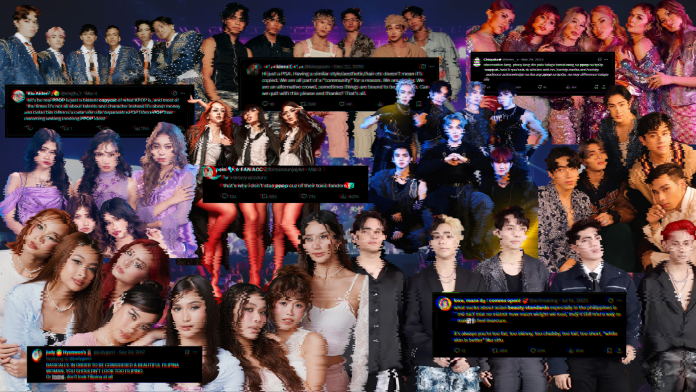“Retokado na ‘yan, tignan mo yung ilong oh, pango dati ‘yan!”
Where beauty standards sometimes overshadow talent, Filipinos have a unique way of supporting their own—as long as it aligns with what we find appealing.
I often hear remarks like the one above. Though common, these comments reveal a deeper issue in how we perceive beauty and talent. It’s something we need to confront: talent shouldn’t be measured by superficial traits or shallow comparisons.
I’ve always been a fan of OPM. As a singer, I naturally pay close attention to different genres, lyrics, and the criticisms surrounding Filipino music. But I never fully explored P-Pop until recently.
I used to wonder, “Worth it bang pakinggan ‘to?” Coming from a strong K-Pop background, I was skeptical.
For most of my teenage life, I was deeply immersed in K-Pop—I knew the groups, the fan culture, the industry struggles. It was a world I completely understood. But it wasn’t until recently that I truly discovered P-Pop. That fresh exposure opened my eyes to a vibrant, flourishing music scene I had previously overlooked.
I’ve always been vocal about how proud I am of our language, and through P-Pop, our beautiful Filipino language is given the spotlight it deserves.
Sa pamamagitan nito, nabibigyang-diin ang ganda at pagiging kakaiba ng ating sariling wika.
One of the most fascinating things about Filipino is how a single word can carry different meanings depending on context—like in SB19’s “Gento,” where the word can simultaneously mean “ganito” (“like this”) and “ginto” (“gold”).
This flexibility is something P-Pop artists skillfully highlight, showcasing the richness of our language in their music. I know—it’s ironic that I’m writing this in English. But that doesn’t diminish the pride I feel when I hear Filipino lyrics beautifully blended into melodies that truly deserve recognition. Every song is a testament to the power of our culture and language.
Thanks to a friend, I was able to explore P-Pop beyond just the well-known groups like SB19 and BINI. It opened my eyes to the vast and dynamic world of the genre, which I hadn’t realized was so expansive.
During my internship, I saw a list of over fifty P-Pop groups written on a sliding door. I was stunned—there were so many more than I had imagined.
But with recognition comes criticism. P-Pop is often met with harsh comments like “Gaya-gaya lang ‘yan!” “Hindi naman maputi ‘yan dati,” or “Sumikat lang kasi may isang pogi.”
These criticisms reveal a deeper prejudice that undermines the very essence of P-Pop. Talent should never be judged based on appearance or superficial comparisons.
P-Pop is more than just aesthetics. It’s an industry built on passion, perseverance, and raw talent. Yet we often diminish these artists’ efforts by reducing them to shallow remarks.
Such comments ignore the immense hard work, creativity, and dedication that P-Pop artists pour into their craft. Many of these biases aren’t unique to Filipino music—they also exist in K-Pop, Western pop, and other global scenes.
The media often recycles negative narratives, reinforcing tired stereotypes. But if people opened their minds and gave P-Pop a fair chance, they’d uncover its distinct sound, rich culture, and growing impact.
Bakit hindi natin bigyan ng pagkakataon ang sariling atin?
One night, while reflecting on my thoughts about P-Pop, I casually played a random track in the background. At first, I wasn’t paying attention—but then something happened. My fingers started tapping. My head subtly nodded to the beat. Before I knew it, I was humming along.
That fleeting moment made me realize something profound: P-Pop isn’t just an industry. It’s an experience—something that resonates deeply. It’s proudly Filipino, yet universally felt. It connects people across borders.
This is an industry with massive potential. If nurtured properly, it can thrive on a global scale and make waves on the world stage.
So why should we embrace P-Pop? It’s an untapped goldmine—not just financially, but in the talent, culture, and recognition it can bring to the forefront. Sure, it can generate revenue—but more importantly, it strengthens our cultural identity and showcases Filipino excellence.
P-Pop offers more than just catchy tunes. It generates jobs, inspires creativity, and ignites pride among Filipinos everywhere.
It’s not just another genre. P-Pop represents the culmination of years of hard work, creativity, and commitment from Filipino artists striving to make their mark—both locally and globally.
Behind every track lies something powerful. P-Pop is still growing, but day by day, it continues to prove its worth. A single vote, stream, or even a star can be a lifeline to artists who pour their hearts into their craft. P-Pop is a movement, a cultural awakening, and a celebration of Filipino talent.
At JuanCast, we believe in amplifying voices that deserve to be heard—and P-Pop is no exception. So if you haven’t listened to it yet, maybe this is the sign you’ve been waiting for.
And if you still have doubts, just remember these words from Gloc-9’s tribute to a legendary rapper: “Tayo’y mga Pinoy, tayo’y hindi Kano, huwag kang mahihiya kung ang ilong mo ay pango.”
